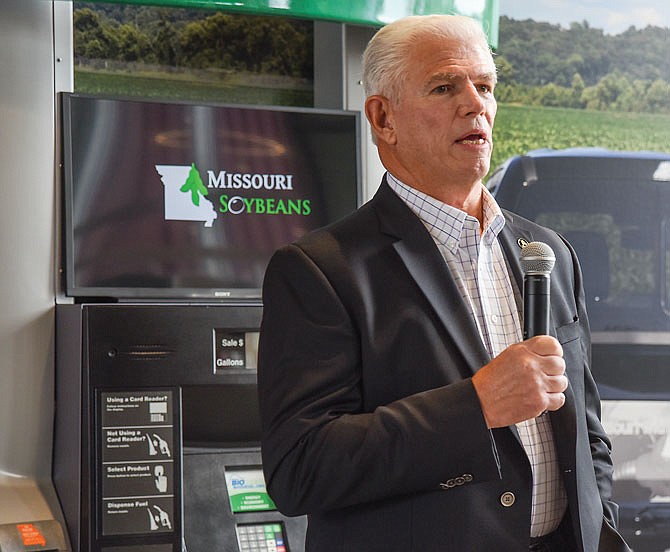A U.S. Department of Agriculture program - combined with matching funds from state and industry partners - is using grant funding to expand sales of ethanol and biodiesel in Missouri and other parts of the Midwest and Great Plains.
For some local Casey's General Stores, that's going to mean replacement of dispensers at fueling stations.
Rebeckah Freeman Adcock - USDA's administrator of the Rural Business-Cooperative Service - announced Thursday at the Center for Soy Innovation in Jefferson City six grants worth more than $5.8 million were being awarded through the Higher Blends Infrastructure Incentive Program, or HBIIP, to boost biofuel demand.
The grants to private companies will help fund replacement of fuel dispensers and storage tanks at fueling stations in Center, Nixa, Seymour, St. Joseph, Festus, Hillsboro, Arnold, Barnhart, Springfield, Brookline Station, Buffalo, Kirksville, West Plains, Winfield and at the Casey's General Stores in Jefferson City and Holts Summit.
The more than $4.9 million grant to Casey's - headquartered in Ankeny, Iowa - is the largest HBIIP grant included in the six announced Thursday, and will be used to replaced 346 dispensers at 70 fueling stations in 13 states, including Missouri, to boost ethanol sales by a projected 19.6 million gallons per year.
A smaller grant of more than $1.5 million to Des Moines, Iowa-based Kum & Go LC is expected to boost ethanol sales by another 23.2 million gallons per year.
In all, $22 million of awarded investments nationwide are expected to increase ethanol demand by nearly 150 million gallons annually, according to a USDA news release.
Adcock said the upgrades at the 17 Missouri locations would boost ethanol sales by a little under 8 million gallons a year, which would translate to about 22.5 million more bushels of corn needed to be converted into the liquid fuel.
Story continues below video
She said that will help stabilize corn and soybean markets.
Missouri Department of Agriculture Director Chris Chinn said biofuels - which also includes biodiesel, the target of a more than $126,000 grant to a truck stop in St. Joseph - support approximately 6,600 jobs and $15 million in net general revenue for the state each year.
Adcock said the USDA is backing about 48 percent of the total costs of the upgrade projects to boost biofuel sales in the state.
Chinn said the Missouri Agricultural and Small Business Development Authority, or MASBDA, is supporting another 25 percent on three projects.
The Missouri Soybean Association and Merchandising Council is backing another $300,000 in matching funds, and the Missouri Corn Merchandising Council is backing another $500,000.
For Jay Fischer - a Jefferson City farmer, owner of Fischer Farms, and board member of the Missouri Corn Merchandising Council - increasing ethanol sales and the demand for corn means a support that can help keep corn prices up, what farmers like him want to hear.
Fischer said in August, the corn market looked like it would be depressed, but he credited trade moves between the U.S. and China to increase buying by the Chinese with an 80 cent increase per bushel over the past seven or eight weeks.
"It's really a positive thing for us to go into harvest. Normally, you never into harvest with price increases - it's usually a depressed price during September, October and November, and this is probably one of the best prices for corn in three or four years," he said.

